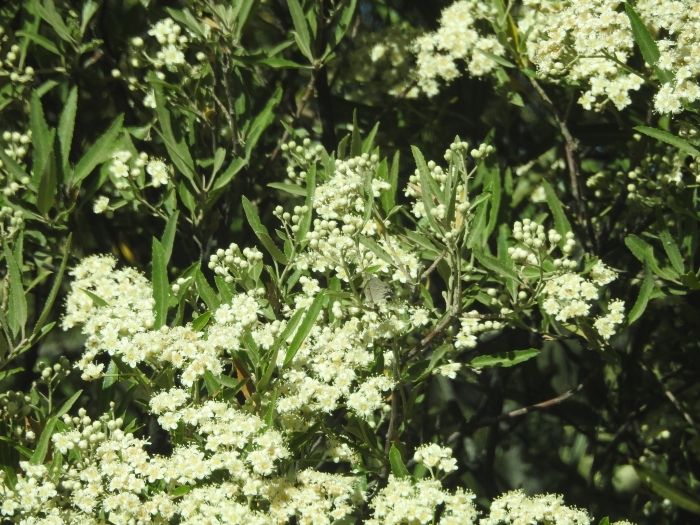Arizona Rosewood
(Vauquelinia californica)
Arizona Rosewood (Vauquelinia californica)
/
/

Rachel Stringham
CC BY 4.0
Image By:
Rachel Stringham
Recorded By:
Copyright:
CC BY 4.0
Copyright Notice:
Photo by: Rachel Stringham | License Type: CC BY 4.0 | License URL: http://creativecommons.org/licenses/by/4.0/ | Rights Holder: Rachel Stringham | Publisher: iNaturalist | Date Created: 2020-06-22T08:24:57-07:00 |





























Estimated Native Range
Summary
Vauquelinia californica, commonly known as Arizona Rosewood, is an evergreen shrub or small tree belonging to the Rosaceae family. It is native to the chaparral and semi-desert regions of the southwestern United States and northern Mexico, where it thrives on rocky slopes and canyons. This species typically reaches heights of up to 15 feet (4.6 meters) when trained as a single-trunked tree, but it can also be maintained as a multi-stemmed shrub. Its appearance is characterized by dark brown, almost black bark streaked with red, resembling true rosewood. The foliage is leathery and glossy green, providing year-round interest. In early spring, Arizona Rosewood produces dense clusters of white blossoms that are highly attractive to bees and other pollinators.
Arizona Rosewood is valued for its drought tolerance and is often used in xeriscaping. It serves as an excellent hedge or screen due to its dense growth habit and can also be a striking ornamental feature in water-wise gardens. It adapts well to full sun or part shade and requires minimal water once established, making it suitable for low-maintenance landscapes. While it prefers well-drained soils, it is adaptable to a range of soil types. Gardeners should note that it may require occasional pruning to maintain the desired form and prevent it from becoming too leggy.CC BY-SA 4.0
Arizona Rosewood is valued for its drought tolerance and is often used in xeriscaping. It serves as an excellent hedge or screen due to its dense growth habit and can also be a striking ornamental feature in water-wise gardens. It adapts well to full sun or part shade and requires minimal water once established, making it suitable for low-maintenance landscapes. While it prefers well-drained soils, it is adaptable to a range of soil types. Gardeners should note that it may require occasional pruning to maintain the desired form and prevent it from becoming too leggy.CC BY-SA 4.0
Plant Description
- Plant Type: Tree, Shrub
- Height: 20-25 feet
- Width: 15-25 feet
- Growth Rate: Slow
- Flower Color: White
- Flowering Season: Spring, Summer
- Leaf Retention: Evergreen
Growth Requirements
- Sun: Full Sun, Part Shade
- Water: Low
- Drainage: Medium, Fast
Common Uses
Bird Garden, Border Plant, Butterfly Garden, Drought Tolerant, Fire Resistant, Low Maintenance, Showy Flowers, Street Planting
Natural Habitat
Native to chaparral and semi-desert regions of the southwestern United States and northern Mexico
Other Names
Common Names:
Scientific Names: , Vauquelinia californica, Vanquelinia californica, Spiraea californica,
GBIF Accepted Name: Vauquelinia californica (Torr.) Sarg.